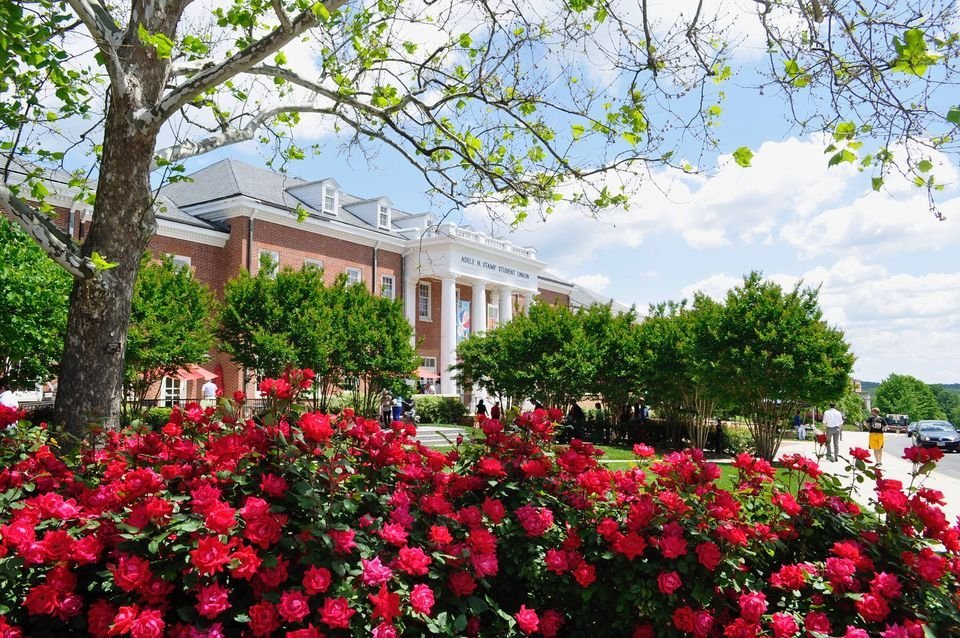Natural Hazards Research Summit 2024
May 14–15, 2024 | College Park, MD | #NatHazSummit24
Program – Day 2, Wednesday May 15
|
7:45 AM |
||||
|
8:30 AM |
Plenary Session Welcome - Allison Reilly, Associate Professor, Unversity of Maryland |
|||
|
9:05 AM |
Transition / Break |
|||
|
9:15 AM |
Parallel Sessions 1 |
|||
|
1A Shiling Pei, Colorado School of Mines
|
1B Lori Peek, University of Colorado Boulder, NHERI CONVERGE
|
NHERI Graduate Student Council |
1D Carol Friedland, Louisiana State University |
|
|
10:45 AM |
Break |
|||
|
11:15 AM |
Parallel Sessions 2 |
|||
|
2A Erica Fischer, Oregon State University |
Greg Deierlein and Adam Zsarnoczay, Stanford University, NHERI SimCenter |
2C Joseph Trainor, University of Delaware |
2D Kishor Mehta, Texas Tech University |
|
|
12:45 PM |
Lunch (with Networking Opportunities) |
|||
|
1:45 PM |
Parallel Sessions 3 |
|||
Tori Tomiczek, United States Naval Academy |
Joe Wartman, University of Washington, NHERI Rapid |
Karina Vielma & Robin Nelson, University of Texas San Antonio, NHERI Network Coordination Office |
Sara Hamideh, Stony Brook University
|
|
|
3:15 PM |
Break |
|||
|
3:45 PM |
Parallel Sessions 4 |
|||
|
4A David Roueche, Auburn University |
Maria Esteva, University of Texas, NHERI DesignSafe |
4C Marti LaChance, NHERI NCO Communications |
4D Jennifer Bridge, University of Florida |
|
|
5:15 PM |
Adjourn |
|||
Breakfast and Coffee (with NSF Network Opportunity)
7:45pm – 8:30pm
Join these NSF Program Directors for an informal networking session during breakfast:
Giovanna Biscontin, Program Director, Engineering for Civil Infrastructure
Daan Liang, Program Director, Human, Disasters, and the Built Environment
Daniel Linzell, Division Director, Civil, Mechanical, and Manufacturing Innovation
Joy Paushke, Program Director, Engineering for Civil Infrastructure/NHERI
Danielle Sumy, Program Director, Innovation and Technology Ecosystems
Parallel Sessions 1
9:15am – 10:45am
Title: Shake Table Testing of Resilient Tall Wood Buildings [Panel]
Organizer(s):
Andre Barbosa, Oregon State University
Panelists/Speakers:
Andre Barbosa, Glenn Willis Holcomb Professor in Structural Engineering, Oregon State University
John W. van de Lindt, Harold H. Short Endowed Chair Professor, Colorado State University
Jeffrey Berman, Professor, University of Washington
Description: This session will discuss the two large scale wood building testing projects conducted at NHERI@UC San Diego shake table in the past two years. You will hear perspectives from both the site and researchers (users), and be able to ask questions in a discussion panel format.
Title: Training to CONVERGE: A Tabletop Exercise to Advance Reconnaissance Research [Panel]
Organizer(s):
Jennifer Horney, University of Delaware
Panelists/Speakers:
Juyeong Choi, SUMMEER, Florida A&M University and Florida State University
Tim Cockerill, NHERI DesignSafe, University of Texas at Austin
David Frost, GEER, Georgia Tech
Jen Horney, PHEER, University of Delaware
Julio Ramirez, NHERI Network Coordination Office, Purdue University
David Roueche, StEER, Auburn University
Joe Wartman, NHERI RAPID Facility, University of Washington
Description: In April of 2024, the CONVERGE Leadership Corps convened a tabletop exercise in Atlanta, Georgia, to test the communication and coordination capabilities of the extreme events research and reconnaissance (EERs) networks. The tabletop, which was supported by the Centers for Disease Control and Prevention and the NSF, featured a mass casualty earthquake-tsunami scenario where the leaders of the EERs and the various NHERI facilities that support reconnaissance and research worked to clarify how researchers associated with these networks would ethically collect and rapidly publish perishable data after the event. The tabletop was also concerned with advancing deeper interdisciplinary integration and convergence research. This panel presentation will describe the exercise and share the results of the evaluation research that assessed the impact of the tabletop.
Title: Building Your Professional Brand: The Importance of Networking and Establishing a Research Story [Workshop]
Organizer(s): NHERI Graduate Student Council
Panelists/Speakers:
Natalie Coleman - Texas A&M University
Richard Campos - University of Oklahoma
Daniel Yahya - Auburn University
Jordan Nakayama - Auburn University
Najiba Rashid - Oregon State University
Description: This workshop will emphasize the value of leveraging both expertise and interpersonal skills in a natural hazards network to tie in and establish a research story. A research story is a scholar’s personal brand, expertise, and presence in the field of research and practice. Research stories help scholars build connections, secure funding, bridge disciplines and conceptual gaps, and contribute to the broader scientific community and field of practice. This session will assist early-career researchers in crafting their research story by combining theoretical and practical aspects of brand building. The goal of this session is to encourage young researchers to increase their marketability, build interdisciplinary connections, and round their expertise in connection with real-world understanding and application in the field of natural hazards research and practice.
Title: Enhancing Flood Resilience through Elevated Homes and ASCE Standards
Organizer(s): Carol Friedland, Louisiana State University
Panelists/Speakers:
Daniel Cox, Oregon State University
John L. Ingargiola, FEMA
Adam Reeder, CDM Smith
Description: This session will delve into the critical issue of flood resilience We will focus on the concept of elevated homes as a practical approach to mitigate flood risks. Additionally, the discussion will center around flood loads, the implementation of ASCE 7 (Minimum Design Loads for Buildings and Other Structures) and ASCE 24 (Flood Resistant Design and Construction).
The US has experienced its fair share of flood-related challenges, and this session aims to explore innovative solutions, best practices, and the integration of ASCE standards to improve community resilience. By bringing together experts in the field, we aim to address the unique challenges and opportunities related to flood resilience.
Parallel Sessions 2
11:15am – 12:45pm
Title: Wildland Urban Interface Fire and Adaptation to Changing Climate [Panel]
Organizer(s): Erica Fischer, Oregon State University
Panelists/Speakers:
Lauren Linderman, University of Minnesota
Joe Wartman, University of Washington
Haizhong Wang, Oregon State University
Description: Research on wildfire impacts to communities is inherently multidisciplinary. Therefore the NHERI community is primed to perform experiments, numerical, and in field investigations to develop new knowledge on wildfire risk reduction within communities. This session will be a panel discussion of researchers from universities, the forest service, and US fire administration on state of the practice and what is needed. This will then open to a brainstorming session within the audience on how NHERI can best fit these needs and what infrastructure is needed to do that.
Title: Regional Simulations to Support Risk Mitigation and Resilience Planning [Presentations and Panel Discussion]
Organizer(s): Greg Deierlein and Adam Zsarnoczay, Stanford University, NHERI SimCenter
Panelists/Speakers:
Jamie Padgett, Rice University
Milad Roohi, University of Nebraska-Lincoln
Elaina Sutley, University of Kansas
John van de Lindt, Colorado State University
Adam Zsarnoczay, Stanford University
Description: Strengthening community resilience to natural hazards requires reliable information to quantify the relative benefits and effectiveness of measures to mitigate risks and promote recovery. This session will examine how high-resolution computational simulations can address important topics in risk mitigation and resilience planning. The discussion will span across hazard science, engineering, and social-science realms with a focus on (1) the status of simulation tools for regional risk assessment and recovery planning, (2) data and modeling needs to support simulations of the built and socio-economic environments, and (3) exemplary examples of how resilience planning can be informed by high-resolution regional simulations.
Title: Exploring Equity in Mitigation: Concepts, Interventions, and Outcomes [Interactive Discussion]
Organizer(s): Joseph Trainor, University of Delaware
Panelists/Speakers:
Sarah DeYoung, University of Delaware
A.R. Siders, University of Delaware
Kay Atoba, Texas A&M
Description: Equity in Disaster and Risk Reduction efforts has been explored for more than half a century. Even so, recent events have catalyzed greater interest in exploring equity and developing policy solutions that help create a more equitable world. This panel will focus on unpacking the wide variety of concepts related to equity and corresponding measures of each. In addition, we will invite participants to provide additional perspectives and examples from their emerging and/or extant work. The objective will be to work together to expand how we think and talk about representing equity in our work. This research is on-going, supported by a National Science Foundation Coastlines and People grant.
Title: Technology Transfer of Focused Research to Application through an NSF IUCRC [Panel]
Organizer(s): Kishor Mehta, Texas Tech University
Panelists/Speakers:
Ioannis Zisis, Florida International University;
Delong Zuo, Texas Tech University
Eric Haefli, StateFarm
Karthik Ramanathan VERISK
Marc L. Levitan,National Institute of Standards and Technology
Description: The Wind Hazard and Infrastructure Performance (WHIP) Center (www.whipc.org) pursues research with a focus on industry needs. The Center is a collaborative endeavor between the government (NSF), Industry (private companies, professional organizations, and state and federal agencies), and academia (universities). The mission of the Center is to pursue research to enhance the resiliency of buildings and infrastructure to extreme windstorms such as hurricanes and tornadoes. The objective of the Center research is to provide results that industry members can incorporate in their practice. During the past five years of the Center’s existence the faculty and students at participating universities have conducted research of interest to member companies. The results are incorporated in professional practices of insurance companies, roofing industry, and risk modelling enterprise. The concept and set-up of the Center is an excellent example of the transfer of research results to professional practice. A combination of investigators and participating industry members will discuss three projects and the use of results; 1. Tornado loading on buildings, 2. Differentiating damage from wind and surge, and 3. Impact of trees on building damage.
Parallel Sessions 3
1:45pm – 3:15pm
Title: Advances and Future Needs for NHERI Research on Engineering With Nature [Presentations + Breakout Discussions]
Organizer(s): Tori Tomiczek, United States Naval Academy
Panelists/Speakers:
Che-Wei Chang, Assistant Professor, University of Rhode Island
Alberto Canestrelli, Assistant Professor, University of Florida
Description: Interest in leveraging natural and nature-based infrastructure to provide engineering, environmental, and economic services has rapidly increased in the last decade. Initiatives such as the Engineering With Nature (EWN) initiative by the U.S. Army Corps of Engineers have made significant advances in understanding the engineering performance under operational and extreme natural hazard stressors. However, questions remain surrounding the performance and application of these systems, particularly considering natural infrastructure’s interaction with conventional engineering systems, performance variability over time, and vulnerability to damage during natural hazards events. This session will provide an overview of recent advances in NHERI Research Engineering With Nature through a series of lightning talks before shifting to breakout group discussions of research questions, opportunities, and challenges surrounding natural hazards research on Engineering With Nature.
Title: Utilizing Street View Imaging for Community-level Natural Hazards Assessment [Presentations + Panel Discussion]
Organizer(s): Joe Wartman, University of Washington, NHERI RAPID Director
Panelists/Speakers:
Lori Peek, Director, CONVERGE, University of Colorado Boulder
Maria Esteva, Data Curator, Designsafe, University of Texas, Austin
Barbaros Cetiner, Postdoctoral Researcher, SimCenter, University of California, Berkeley
David Roueche, Associate Professor, StEER, Auburn University
Description: Street view imaging (SVI), which involves capturing and analyzing ground-level imagery, has emerged as a powerful tool for evaluating natural hazards, and this session will explore its current applications, challenges, and future potential. The session will consist of brief presentations and an in-depth panel discussion examining various topics related to SVI, such as recent research applications and their outcomes, advancements in machine learning techniques for SVI data analysis, and legal, ethical, and privacy considerations, including informed consent, anonymization, and responsible data handling. The session will conclude by highlighting potential future uses of SVI, such as citizen science initiatives, educational efforts, historical disaster analysis, and the development of virtual disaster simulations.
Title: Designing Interdisciplinary Natural Hazards Research Proposals: Leveraging the NHERI Science Plan and Incorporating Broader Impacts & Technology Transfer [Interactive Workshop]
Organizer(s): Robin Nelson, University of Texas San Antonio, NHERI Network Coordination Office
Moderators:
Robin Nelson, Research Fellow, University of Texas at San Antonio
Panelists/Speakers:
Bill Holmes, Structural Engineer, Rutherford + Chekene
Description: This workshop, designed for early-career researchers, will employ collaborative groups and natural hazards experts to explore the NHERI Science Plan’s key questions that generate an interdisciplinary natural hazards research plan. Researchers will identify opportunities to enhance their disciplines by working collaboratively to identify key questions from Science Plan. An overview of broader impacts will also help strengthen the proposal ideas, and with the assistance from members of the NHERI Technology Transfer Committee, groups will create a plan to translate the research into practice. The workshop guarantees time to think about ideas for interdisciplinary research while networking with other participants in the natural hazards research community.
Title: Longitudinal Observation, Analysis, and Modeling to Measure and Enhance Community Resilience
Organizer(s):
Jennifer Bridge, University of Florida
Panelists/Speakers:
Sara Hamideh, Stony Brook University
Elaina Sutley, University of Kansas
John van de Lindt, Colorado State University
Rachel Davidson, University of Delaware
Description: Longitudinal observations of community recovery following an extreme event are required to better inform solutions for community resilience and provide inputs for hazard recovery models to drive policy decisions. However, surveys that track the complex and multi-dimensional nature of hazard impacts and recovery are challenging to plan and implement over the entire recovery period. The objectives of this session are to present successful approaches to longitudinal observation and analysis of recovery while also identifying current gaps in data, infrastructure (cyber and physical), and human resources required to support long-term community testbed development and operation. The session combines presentations and an interactive panel discussion to identify opportunities, challenges, and lessons learned in longitudinal observations, testbed development, and working with community participants.
Parallel Sessions 4
3:45pm – 5:15pm
Title: Hurricane Ian (2022): Lessons Learned and Case Study for Sustained Community Engagement
Organizer(s): David Roueche, Auburn University
Moderator: Ian Robertson, University of Hawaii at Manoa
Panelists/Speakers:
Dan Cox, Oregon State University
David Roueche, Auburn University
Marc Levitan, National Institute of Standards and Technology
Jeff Berman, University of Washington
Description: Hurricane Ian (2022) made landfall near Ft. Myers, FL as the deadliest hurricane since Katrina in 2005, mostly a consequence of a catastrophic storm surge impacting vulnerable communities on Florida’s barrier islands. The severe and widespread impacts to human life and property spurred investigative responses from numerous stakeholders representing the counties, state of Florida, federal government, academia, and industry. Building on these responses, this session has three primary objectives: (1) highlight innovative assessment methodologies and synthesize the major findings from representative investigations of Hurricane Ian’s impacts, (2) report out on efforts to engage with local communities for bi-lateral sharing of findings and needs, specifically focusing on a Hurricane Ian workshop held on-site in Ft. Myers Beach in early 2024, and (3) engage open discussions from the audience on paths forward to improve and sustain community engagement in the aftermath of future disaster. The session will consist of focused, lightning style talks for the first 30 minutes, a panel discussion for the next 30 minutes, and open discussion with the audience for the remaining 30 minutes
Title: Scientific Advancements and Practical Implications of Data Reuse in Natural Hazards Research [Presentations + Panel Discussion]
Organizer(s): Maria Esteva, University of Texas, NHERI DesignSafe
Panelists/Speakers:
Maria Esteva, University of Texas at Austin
Pedro L. Fernández-Cabán, FAMU FSU (Florida Agricultural Mechanical University - Florida State University)
Elaina Sutley,The University of Kansas
Cláudia Reis, Lehigh University
Andre Barbosa, Oregon State University
Description: The panel will convene: a) researchers that design and publish datasets for others to reuse (e.g., testbeds, LEAP experiments, aggregations of historical data, etc. ), b) researchers that reused data created by others (e.g. train ML models, numerical and experimental validation, model development, etc.) and c) the DesignSafe data curator. The speakers will represent engineers and social scientists that study different types of natural hazards using different research methods. The first group will present their goals when designing data, their strategies for facilitating data reuse, and their expectations about usage. The second group will speak about their data needs; the ways in which they reuse data, and if and how discoverability, availability and quality of the data shapes their investigations. All will discuss how their research advances the field of natural hazards. In response to the issues raised by the researchers, the data curator will introduce practical and ethical aspects of data reuse including: curating data to maximize reuse, strategies to find and use data in DesignSafe, navigating data licenses and access restrictions, and metrics that are gathered to assess data impact
Title: The Ultimate Guide to NSF Branding, Storytelling, and Media Engagement: Tips and Best Practices
Organizer(s): Marti LaChance, Purdue University, NHERI NCO
Panelists/Speakers:
Miriam Kleiman, Public Affairs Specialist, Office of Legislative & Public Affairs, U.S. National Science Foundation
Denise Zannino, Science Policy and Communication Analyst, Office of Legislative & Public Affairs, U.S. National Science Foundation
Description: Specialists from the NSF Office of Legislative and Public Affairs (OLPA) will discuss the new NSF Policy on Brand Standards and how to apply its brand elements effectively; the upcoming NSF 75th anniversary and how recipients can contribute and engage; tips for compelling research storytelling; and guidance for interacting with the news media. Questions from attendees encouraged!
Title: Community Response to NSF NHERI Decadal Vision Study
Organizer(s): Jennifer Bridge, University of Florida
Panelists/Speakers:
Norah Schneider, Nexight Group
Description:As a follow-up to the presentation of the NHERI Decadal Visioning Study by Nexight Group, this session will allow participants to provide their feedback on the study in a structured discussion format. Participants will be asked to discuss aspects of the report in small groups and then summarize their feedback for inclusion in the Summit report. .








